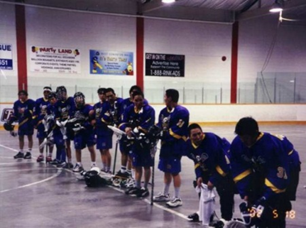
The arctic tundra: an often romanticized climatically contrasting region of the world, as typified through the voice of the prolific Pierre Berton, where intense 100 km/hr winds, -60C temperatures, bright dense summer flora and immense 9kg arctic char create an image often associated with the spirit of the Canadian explorer; where beauty meets endurance and mankind meets himself. Those elements do exist in the small hamlet of Kugluktuk, Nunavut, but there also exists a set of starkly harsh and contrasting realities for those who live in geologic and social isolation for most of the year, where, for many, 10 or more family members might live in a small bungalow built on stilts, where 20 hours of darkness per day and few economic opportunities segue into indifference, immobilization and dark choices.
When Russ Sheppard (Class of 2013) arrived in Kugluktuk in 1998, possessing a B.Ed from the University of Saskatchewan and a desire to make a connection with students, he was also unprepared for the profound misery and hopelessness that faced the youth and the community. Chronic cycles of family drug and alcohol abuse, domestic violence and low class attendance at the local high school were prevalent. Over the period of several years, the suicide rate in Kugluktuk was the highest in Canada and in February of 2000, a rash of six suicides in a school of 135 students pushed the entire community to the brink of numbed oblivion.
"I knew something needed to be done," said Russ. "The question was what? I was here. I am in this. Something needed to change their mindset…The kids needed to care about life again."
Nurturing a meaningful connection and establishing a solid rapport with the students was critical. "I was a 'southern' teacher with western ideologies about teaching. I had to learn how to become a 'northern' teacher with a different mind-set," said Russ. "They needed to trust that hope existed and that something could transform their circumstances." That connection developed over time and wasn't easy, but "they were ready, they were waiting for something."
The solution came from an unlikely source-the sport of Lacrosse. And the Grizzlies Lacrosse Team was borne. "We needed to find a way to combat the negative forces that plagued the community," said Russ. Although the sport might have been the catalyst that propelled the transformation; it was also a part of a holistic approach to a program that included both significant and incremental changes.
If the students wanted to participate on the team, they were required to fulfill three criteria in the Stay-in-School Grizzlies Lacrosse Program:
-
80% attendance or better;
-
Weekly performance logs including effort assessment;
-
Participate in the development of a social enterprise program as a means of training and fundraising.
The results were significant and changed the landscape of the school and the community. In the inaugural year of the Grizzlies program, attendance exploded from 20% to nearly 100%--a remarkable accomplishment. Slowly, student morale was shifting and the new community-wide prominence of the Lacrosse stick had become a prevalent symbol of hope. Most notably, between the years of 2001-2006, there were no suicides-NONE.

The social enterprise component of the program flourished when the students participated in the management of the concession stand at the local rink as part of the newly formed Grizzly's Den Arcade-an enterprise founded by Russ where he managed operations and administered $500,000 gross annual profits with a net annual profit of $52,000 going into youth recreation programming.
The students also created a team logo, ordered jerseys and equipment, and used some of the funds they raised to travel outside of town to compete in tournaments locally, provincially and across the country.
However, it was not only what they were accomplishing that helped propel the radical axial shift, but, more poignantly, what they had to overcome and endure in order to achieve it. An increase in positive school connections resulted in:
-
stronger familial and community ties;
-
reduced student vulnerability to negative forces such as drug and alcohol dependency;
-
reduced risk of perpetuating the cycle of dependency and domestic violence.
The students learned that everyone had a meaningful purpose and a role to play and contributed to the overall well-being of the individual and the group and in 2006, the team travelled to Winnipeg, Manitoba to participate in the National Lacrosse Championships.
Russ also created the Kugluktuk High School Athletics Association that promoted (to students) school attendance, positive lifestyles and opportunities through sport.
Other unexpected successes arose out of this transformational experience. Russ received numerous awards for his outstanding accomplishments including the Queen's Diamond Jubilee Medal Recipient in 2012, the Sport Nunavut Coach of the Year in 2004 and the Business Development Bank of Canada's Youth Entrepreneur Award in 2003.
He was invited to speak at numerous conferences including the keynote speaker for the US Lacrosse Federation in 2004, presenting for the Six Nations Police Force in Ottawa in 2004 that focused on positive ways to transform a group. And in 2005, his story was told in an ESPN Sports Centre Feature on Model of Change Program.
After a tremendous life-changing seven years in Kugluktuk, Russ was preparing for a career transition. He spent a few years in the Edmonton Public Schools System and some time in Southern Ontario, but was searching for a new challenge.
After much contemplation about 'next steps' and a profound desire to renew his sense of place in the world, he decided that a career in Law would afford him the flexibility he was searching for on many levels:
The Law could:
-
Achieve a different perspective and a different way of thinking;
-
Dismantle barriers;
-
Allow some flexibility to control the 'what and the where' in terms of career direction.
During his time at the U of A Law School, Russ's principal interest was in Aboriginal Law, and in his last year at the school he had been working with Professor Catherine Bell on an Aboriginal Negotiation Competition.
In May, he, along with his wife Maxine, who is an agrologist, and their two children, headed out to Cranbrooke, British Columbia where Russ is currently articling with Rockies Law.
In the meantime, he has also signed a Life Rights Agreement with Northwood Productions which grants permission 'to tell the story' of this transformational symbiotic relationship. Filming is currently in pre-production.
Inspired and humbled, when asked about what his experience has meant to him: "I found myself to be much more self-aware about who I am and who we are. It's real, it's emotional. You really have to push yourself to the brink, because you never know what you are capable of."
The spirit of Henry Marshall Tory's "uplifting the whole people," seems like a fitting commentary that reflects Russ's remarkable commitment to the individual and the collective.